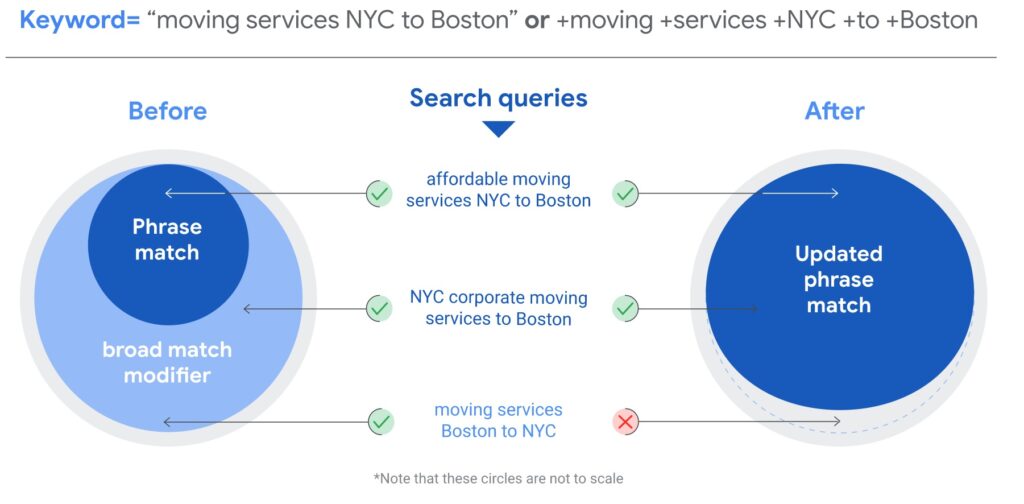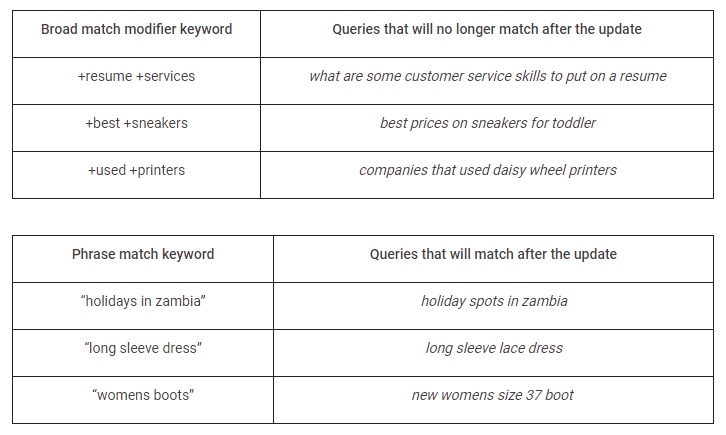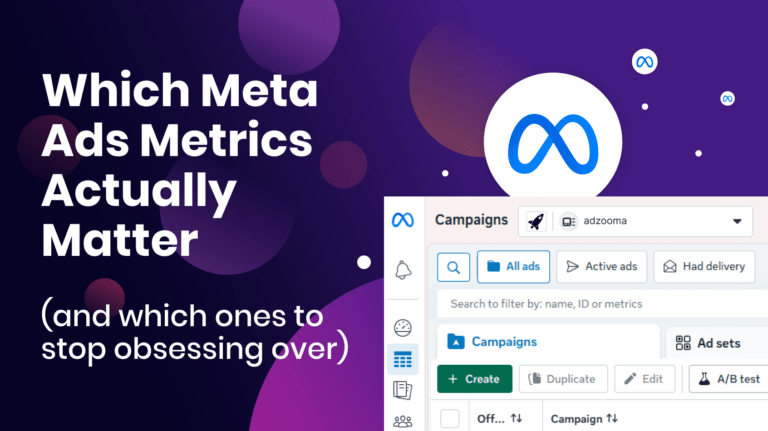Starting from the 18th February, Google Ads have announced that the Broad Match Modifier (BMM) will be phased out and encompassed by an expanded Phrase Match, with traffic and support for BMM to end.
By July no new BBM’s can be added and according to reports by the end of 2021 BMM will no longer be served in Google Ads.
If you’re a big BMM user, this update is massive. If you’re not, you’re going to be pretty much unaffected.
So what’s actually happening here?
This is the image that Google use to explain it:

And these are the examples that Google have given us:

Google is selling this change as a good one. The headline of the article to explain the move is titled, “Making it easier to reach the right customers on Search” and in the article they state:
“To give you more control and better reach, we’re bringing the best of broad match modifier into phrase match. As a result, phrase match will expand to cover additional broad match modifier traffic, while continuing to respect word order when it’s important to the meaning. This makes it easier to reach customers and manage keywords in your account.
“With these improvements, you can reach the searches you want just by using phrase match—without worrying about the searches you don’t want. Let’s say you’re a moving company that wants to reach people interested in moving out of New York City. With the updated phrase match, you can reach people looking to move from NYC to Boston, for example, without showing up for people looking to move from Boston to NYC.”
This is our Head of Paid Media Mark Neale’s take on things:
“Whilst looking to simplify management and save time for advertisers, the changes are actually reorganising where advertisers will be spending more time. More time will be spent trying to acquire search query data that is omitted from the search query report to ensure effective negative keywords are in place.”
But is this actually good news? It’s up for debate and depends who you ask.
Sure it can make it simpler to manage your accounts, but that simplicity comes at a cost.
When Google say they are incorporating BMM into Phrase Match keywords, they’re actually doing something kind of in the middle.
Phrase Match keywords are essentially acting as BMM, so your phrase match terms will show for more terms than what is currently there (these being the previous BMM terms), but now an algorithm will effectively determine the intent for the matching instead of yourself.
On the surface, this could be great and may save you time. However, BMM gave you a broader reach with control, and without that, you’re now relying on Google’s newly built algorithm to be super effective to safeguard you from unnecessary wasted spend.
But it’s hard to have full confidence in the algorithm: one, because it’s difficult for Google to figure out the nuances of every search in the way a human would and two, because we know Google doesn’t have our best interests at heart.
This is the fifth big change to the keyword match type in the last seven years, and just like when Google changed the Search Terms Report in September, you once again now have less ability to fully optimise your account.
Sure, as Google says, this makes things easier for you in one respect. But if that comes at the cost of actual money, then I’m not sure this is something you can sell as a good thing.
This may not be as seismic and catastrophic as it could appear on the surface. We’ll see how it settles once it roles out. For a lot of people, this won’t rock the boat all that much.
But not everyone feels the same way.
The Community’s Reaction
The reaction has been mixed, to say the least. There have been some signs of resignation, some anger, a whole lot of exasperation, and a little bit of positivity too.
Here are some of the best, angriest and most considered tweets about it:
worst change ever, it feels like a nightmare
— Deep Technologies (@deepitcom) February 5, 2021
You are looking live at new match types! pic.twitter.com/vlFNtdyInG
— JOSH B. (@jdb426) February 5, 2021
Sorry @GoogleAds, don’t you mean It’s now easier for Google to take all your money? This is a joke, right?
— Regan McGregor (@reganmcgregorau) February 4, 2021
— Josh Yates (@Jates) February 4, 2021
At first I was like, what. Why do you like more confusion?
More then I understood they’re planning to remove BMM, and just consolidate BMM into phrase.
That’s nice. Too much confusion about the two, and they’re basically the same today anyway.
— Andrew Lolk (@AndrewLolk) February 4, 2021
Agree, not surprising. With word order treated the same “when deemed important” I don’t see it making a big impact one way or the other given the already existing overlap between the two.
— Ginny Marvin (@GinnyMarvin) February 4, 2021
It’s a bit frustrating considering all the account builds I’ve done using BMM and exact match haven’t been using phrase match very often for a few years since my BMM and Exact builds almost always outperformed when anytime I included phrase match.
— Anthony ???? (@ToeKnee_C) February 5, 2021
Honestly I’m not convinced this will negatively impact things this much (that’s not an argument for or against the concept of close variants, BTW), since July 2019 basically saw BMM and P Match behave the same way with Close Variants: https://t.co/pAF5cSSoyZ
— Kirk Williams ???? (@PPCKirk) February 4, 2021
Sure, I’m not saying exact match close variants are a mess, just that BMM and P (not your example) are basically the same thing now. ????????♂️ I could be wrong, and I don’t know if optimistic is the right word… maybe more… resigned? over it? ????
— Kirk Williams ???? (@PPCKirk) February 4, 2021
I mean, it makes sense as match types have been fundamentally broken since close variants & expansion.
If I were GOOG I would still rather fix match types and the horrific close variant matching.
They had moat that no other platform could compete with and are sucking it dry.
— Greg Finn (@gregfinn) February 4, 2021
W G gets it ‘wrong’ and matches you to irrelevant searches that you cannot see due to G hiding queries, what’s your fallback? With the BMM change last year, BMM was getting pretty broad and people ‘fell back’ to phrase. Now do you just put your money on FB instead of @GoogleAds ?
— Brad Geddes (@bgtheory) February 4, 2021
Not surprising but still outraging. In combination with the restricted search term reports, it really has a negative impact on my ability to fully optimize.
— FozzieBaloo (@BalooFozzie) February 4, 2021
Seems like this has been their roadmap since 2011 or earlier. Ah, those were the days for control-freaks. Nostalgia is powerful, and those days are long-gone.
— Jeremy Morgan ; ????☠️ (@porpster) February 4, 2021
With some people reporting less and less visibility of terms anyway recently, this change seems to have come at the perfect time…for Google. #ppcchat
— Azeem (@AzeemDigital) February 4, 2021
So what should you do?
Speaking to Mark Neale again he says:
“My initial thoughts are this could be a tough settling in period. For some advertisers this could be heavily disruptive to their existing account structures. There are glimpses of positivity ahead in that some advertisers are seeing increased performance with pairing broad keywords with smart bidding strategies, so there are instances in which the wider approach works. At the end of 2021 will we still see this as a disruption to the way we work, or will this be a step forward towards better keyword matching? I’m optimistic for better keyword matching.”
Google say they’re making things simpler, are they? I’m not sure.
If you’re a big BMM user, to mitigate this change, you’re going to have to start drilling down and getting rid of as many irrelevant search terms as you can – the safety net of BMM is no more.
So it’s going to be a matter of getting your head in the audience data then taking your head and dunking it straight into the negatives. That’s where you’re going to have to live for a while.
Without really getting into the data and spending time researching, you will see money seep out of a lot of your accounts needlessly (again, just like after the change to the search terms report).
This won’t apply to everyone. Some of you may have strategies out there that benefit from taking a little bit broader approach and not all of you will have been using BMM’s all that much either.
But for those of you who work in a niche where it pays to have an account that’s tightly managed, you’re going to have to reign in the spend on non-exact match types, then cross-reference this with as much data you can find through audience analysis tools and the Search Terms Report.
Drilling down into this will help you get rid of those irrelevant terms and find those leaks in your boat.
It’s not an easy task, but it’s a necessary one. And definitely doesn’t make things simpler, whatever Google says.
What’s your take on Google’s latest move? Head over to our Digital Marketing Facebook group to get involved in the conversation.




